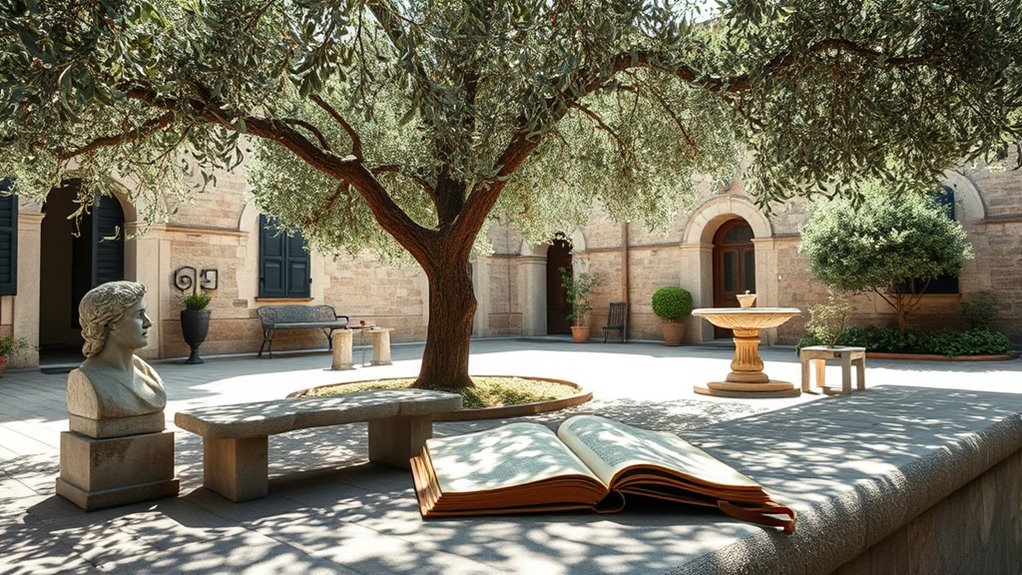To master life with Epictetus’ wisdom, focus on controlling your reactions and cultivating inner virtues like patience, humility, and acceptance. Recognize that external circumstances—such as luck, market changes, or technological shifts—are beyond your influence, so don’t let them disturb your peace. Instead, maintain mindfulness and self-reflection to strengthen resilience and inner stability. If you want to discover how to apply these principles daily and find true happiness, there’s more to explore.
Key Takeaways
- Focus on controlling your internal responses and attitudes rather than external circumstances.
- Practice detachment from possessions and outcomes to cultivate inner peace and resilience.
- Recognize external events as beyond influence and accept them with virtues like patience and humility.
- Use mindfulness and self-reflection to strengthen inner virtues and manage emotional reactions.
- Embrace change and uncertainty as opportunities for growth, guided by internal discipline and acceptance.
Embracing the Core Philosophy of Epictetus

To truly embrace the core philosophy of Epictetus, you must understand that his teachings center on the distinction between what you can control and what you cannot. This awareness encourages detachment practices, helping you release the need for external validation. Rather than seeking approval from others or relying on external possessions for happiness, focus on cultivating internal virtues. By accepting that external events are beyond your influence, you reduce emotional disturbances and build resilience. Recognizing the perishable nature of external items further reinforces the importance of inner stability over external possessions. This mindset shifts your energy inward, emphasizing self-control and inner growth over fleeting external circumstances. Developing mindfulness about your reactions and perceptions can significantly strengthen your ability to remain centered amid life’s uncertainties. Incorporating Stoic principles into daily life can deepen your understanding and application of these teachings. Consistently practicing these principles can lead to a deeper sense of inner tranquility and personal integrity. Embracing this core principle leads to tranquility, freedom, and a stronger sense of personal integrity.
Understanding What Is Within Your Control

Understanding what is within your control is the foundation of living according to Epictetus’s teachings. You focus on internal mastery—your thoughts, attitudes, and actions—rather than external control, which is beyond your influence. Recognize that external things, like others’ opinions or events, are weak and transient. Your true power lies in how you respond and perceive these events. By differentiating what you can change from what you cannot, you prevent frustration. This mindset helps you stay centered, resilient, and free from emotional disturbances caused by external circumstances. Cultivating resilience through understanding your limits allows you to navigate life’s uncertainties with equanimity, fostering a calm and balanced mind even in challenging times. Embracing mindfulness enables you to remain aware of your reactions and maintain a sense of inner peace regardless of external chaos. Developing a clear understanding of emotional regulation can further enhance your ability to stay composed and focused amid adversity. Recognizing the importance of self-awareness can help deepen your grasp on what is within your control and how to effectively respond.
Cultivating Inner Virtue for Lasting Happiness

Cultivating inner virtue is essential because it forms the foundation of lasting happiness according to Epictetus. When you practice mindful gratitude, you focus on appreciating what’s within your control—your character and choices—rather than external events. This strengthens emotional resilience, allowing you to remain steady amid life’s ups and downs. By consistently nurturing virtues like patience, humility, and self-control, you shift your reliance from fleeting external circumstances to enduring internal qualities. This inner cultivation shields you from disappointment and cultivates true happiness rooted in your character, not outside possessions or approvals. For instance, understanding Skincare Patches’ proper application timing can help you recognize the importance of consistent self-care routines that support inner well-being. Furthermore, choosing a meaningful dog name that reflects your values can reinforce your commitment to personal growth. Understanding city dynamics can help you navigate social and cultural changes more effectively. Recognizing the importance of virtue cultivation allows you to build a resilient mindset that sustains happiness through life’s inevitable challenges. Ultimately, virtue becomes your steady anchor in a changing world.
Accepting Life’s Unpredictable Nature

Embracing the unpredictability of life means recognizing that you can’t control everything that happens around you. Fate and destiny unfold beyond your influence, and luck and chance often shape outcomes. Instead of resisting these forces, accept them as natural parts of life’s flow. When you stop fighting what’s outside your control, you prevent unnecessary suffering. Trust that external events are transient and beyond your power to manage. Focus on your internal virtues, which remain within your control. By accepting life’s uncertainties, you cultivate resilience and peace, understanding that true stability comes from within, not from controlling external circumstances. Recognizing the importance of toilet maintenance and repairs can also help you adapt to unforeseen issues without distress.
Practical Strategies for Detachment and Resilience

To build resilience and detach from external chaos, you must actively practice mental discipline that shifts your focus inward. Emotional regulation is key—by observing your reactions without judgment, you prevent external events from disturbing your inner peace. Recognize that material attachment weakens your independence, so let go of the need for possessions or outcomes to define your happiness. Instead, cultivate internal virtues like patience and acceptance. When you accept what you cannot control, you develop resilience. Practice this consistently: remind yourself that external circumstances are fleeting, and true strength lies in your internal character. Incorporating mindfulness techniques, such as deep breathing exercises, can further enhance your ability to stay centered. Utilizing wicks in your practice can symbolize the importance of foundational support in maintaining your stability. Recognizing that diversification reduces investment risk can help you approach your personal resilience with a strategic mindset. Developing awareness of emotional triggers can also help you understand how external stimuli affect your internal state and enable you to respond more thoughtfully. Being aware of water-related concepts can also help you understand how to stay buoyant amid life’s challenges. This approach fosters calm, clarity, and lasting resilience amid life’s unpredictability.
Recognizing the Illusions of External Goods

External goods often appear to hold great significance, but Epictetus teaches that these are mere illusions—fragile, transient, and beyond your control. The perceived value of wealth, status, or possessions depends on external validation, which can easily fade or mislead. When you rely on external things for happiness, you give away your inner freedom. Recognize that their importance is superficial; true worth comes from internal virtues and character. By seeing external goods as illusions, you prevent them from dictating your peace. Focus instead on cultivating your inner strength, knowing that external circumstances are fleeting, and your happiness depends on your response, not external validation. Understanding the fragility of external goods helps you keep perspective and maintain tranquility amidst life’s uncertainties.
Developing Mental Discipline and Self-Reflection

How can you cultivate the mental discipline necessary to live according to Epictetus’s teachings? Start with mindful journaling to track your thoughts and reactions, helping you recognize patterns of emotional disturbance. Reflect daily on your responses to external events, strengthening your emotional resilience. By regularly examining your motives and actions, you build self-awareness and discipline. This practice reinforces that your happiness depends on internal virtues, not external circumstances. Incorporate residency requirements in different states into your routine to expand your understanding of different values and perspectives. Over time, self-reflection sharpens your ability to accept what’s outside your control, fostering a resilient mindset. Consistent mental discipline transforms your reactions, aligning your life more closely with Epictetus’s wisdom.
Applying Stoic Principles to Modern Challenges

Applying Stoic principles to modern challenges requires you to focus on what you can control and let go of what you cannot. Achieving financial freedom starts by managing your habits and mindset, rather than external circumstances. Embrace technological adaptation by viewing new tools as opportunities, not threats; accept change as part of life’s natural flow. By controlling your reactions and cultivating virtue, you remain resilient amid economic shifts and rapid innovation. Remember, external factors like market fluctuations or tech trends are outside your influence, but your response and attitude are within your power. Inner discipline and acceptance help you navigate today’s uncertainties with calm and clarity.
Frequently Asked Questions
How Can I Start Practicing Epictetus’ Teachings Daily?
To start practicing Epictetus’ teachings daily, begin with daily reflection. Pause each morning or evening to contemplate what’s within your control and what’s not. Use intentional journaling to write about your reactions to external events, focusing on virtue and acceptance. Remind yourself that external things are weak and transient, so prioritize developing inner character. Over time, this habit helps you align your actions with Stoic principles and cultivate resilience.
What Are Common Obstacles to Applying Stoic Principles?
Imagine trying to steer a boat against the tide—that’s how cultural barriers and personal biases block you from applying Stoic principles. You might struggle to accept what’s outside your control or cling to desires. These obstacles, like deep roots, resist change. To overcome them, recognize your biases and question cultural norms, actively choosing virtue over external approval, so you can navigate life’s currents with clarity and resilience.
How Do I Handle Emotional Reactions Using Epictetus’ Philosophy?
To handle emotional reactions, focus on building emotional resilience and impulse control. When you feel a strong response, pause and assess whether it’s within your control or caused by external factors. Remember, you can’t always control events, but you can control your reactions. By practicing acceptance and reminding yourself that external things are transient, you strengthen your inner virtue, helping you respond calmly and wisely in any situation.
Can Epictetus’ Ideas Help in Managing Modern Stress?
Imagine facing stress so overwhelming it feels like the world’s collapsing—Epictetus’ ideas can help you survive that chaos. His teachings turn you into a mental fortress, using mindfulness techniques to stay present and resilient building to bounce back from setbacks. By focusing only on what you control, you’ll find peace amid modern chaos, transforming stress into a stepping stone for inner strength and unshakable calm.
What Books or Resources Best Support Learning His Philosophy?
If you want to learn Epictetus’ philosophy, start with Stoic literature like the *Enchiridion* and *Discourses*. These texts offer practical exercises to develop your mindset and control your reactions. Look for modern translations, such as Elizabeth Carter’s or George Long’s, which make his ideas accessible. Supplement your study with online resources and Stoic communities to deepen your understanding and practice daily exercises that reinforce his teachings.
Conclusion
By embracing Epictetus’s teachings, you learn to focus on what truly matters—your character and responses. Imagine facing job loss with calm and clarity instead of despair, turning adversity into growth. When you master your thoughts and accept life’s ups and downs, you build resilience and inner peace. This mindset transforms challenges into opportunities, guiding you to live virtuously and find happiness within, no matter what life throws your way.









